GALLUP NEWS SERVICE
PRINCETON, NJ -- There is little doubt these days that "health sells." The Americans public is intensely interested in health and medical news, and television news networks, local television stations, newspapers and magazines are all increasingly filling their airtime and pages with news stories and advice about health matters. Plus, of course, there has been an exponential increase in the health and medical news available on the Internet.
But recent Gallup polling shows that while the American public says it does indeed get a good deal of medical news from these media sources, there are evident problems in terms of how useful it is. Americans give media health reports low trust and credibility ratings, and almost as many say media health reports confuse them as say they provide useful information.
One of the ironic outcomes of this state of affairs is an apparent increased reliance on doctors for health information. The public continues to have considerably higher trust levels in doctors than it does in media sources of health news. And almost half of Americans say that as a result of having seen or read media health reports, they have at least somewhat frequently gone to their doctors in order to ask specific questions about what they have seen or read.
Where Do Americans Get Health and Medical News and Information?
In an early September Gallup Poll, Americans were asked how much health and medical news they received from each of a list of sources:
| Sources of Health and Medical
Information Generally speaking, how much news and information about health or medicine do you get from [RANDOM ORDER] -- a great deal, a moderate amount, not much, or none at all? |
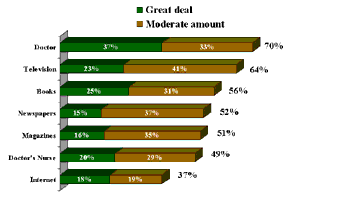 |
| Sep. 5-8, 2002 |
Television is the top media source for health and medical information for Americans when we take into account the percentage of respondents who say they get "a great deal" or "a moderate amount" of health news from each source tested. Television is followed by books, then by newspapers and magazines. (Note that the percentage of Americans who say they get a great deal of health and medical news from books is actually larger than is the case for television, but television wins out, as noted, when those who say they get a moderate amount of health news are also taken into account.)
The Internet is dead last on the list of media sources of health and medical news, considerably behind the other media sources tested.
Two medical sources of health news were included in the list: doctors, and nurses at the doctor's office.
Doctors top the overall list, meaning that all in all, Americans today say they get more health and medical news the old-fashioned way, from their physician, than they do from any of the other sources tested. Doctors' nurses score lower on the list.
There are some interesting differences in use of these media sources by age group:
| Sources of Health and Medical
Information: By Age Group Generally speaking, how much news and information about health or medicine do you get from [RANDOM ORDER] -- a great deal, a moderate amount, not much, or none at all? Percentage who get "a great deal" or "a moderate amount" from each source |
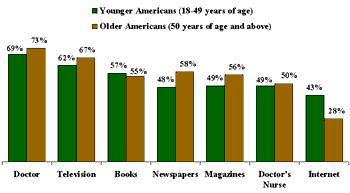 |
| Sep. 5-8, 2002 |
The Internet is not dominant among any age group. Although use of the Internet for health and medical news is certainly more prevalent among younger Americans aged 18-49 than among those 50 and older, it still scores at the bottom of the list of sources.
This is true even among younger Americans.
It is interesting to note that 18- to 49-year-olds are actually a little more likely than those 50 and older to say they use books for health and medical news -- the only source other than the Internet that the younger group uses more frequently than does the 50+ group.
Which Media Sources Are Trusted Most?
With the exception of doctors, who are the most used and the most trusted source of health and medical news, there is no strong relationship between the amount of health and medical news and information Americans get from various sources and the amount of trust and credibility they give the source:
- Television scores at the bottom of the "trust" list. In other words, the public recognizes the high level of exposure to health and medical news provided by television, but discounts its credibility.
- Books are rated second in trust, essentially tied with "the nurse at your doctor's office."
- The Internet does a little better on the trust dimension than television even though it is used much less frequently. The Internet is the third most trusted source of health and medical news among younger Americans.
- As noted, the doctor is the most trusted source of health and medical news.
| Amount of Trust in Health and Medical
Information How much trust and confidence would you have in information about health or medicine that you could get from each of the following sources -- a great deal, a moderate amount, not much, or none at all? |
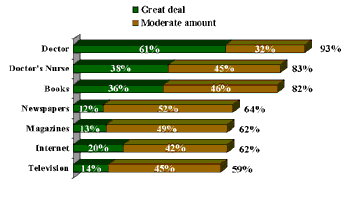 |
| Sep. 5-8, 2002 |
The chart below displays graphically the relationship between the overall level of use of each health information source and the source's level of credibility.
| Sources of Information About Health &
Medicine: Use Versus Trust Total U.S. Population |
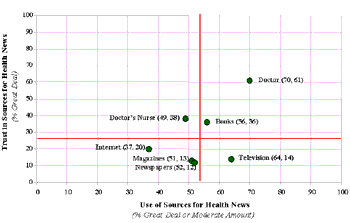 |
| Sep. 5-8, 2002 |
Doctors and books are in the winning, upper right-hand quadrant -- meaning that both of these sources of health and medical news and information (particularly doctors) are above average in terms of their use by Americans, and in terms of their credibility.
Television resides in what we sometimes call the "penalty box." It is above average in terms of use, but below average in credibility.
Nurses would appear to be an underutilized resource. They are above average in terms of the level of trust and credibility they are given by the public, but are below average in terms of the level of information that the public gets from them.
Benefit or Confusion?
One reason Americans may have relatively low levels of trust in media sources of health and medical news becomes apparent when we examine the responses to a question about the benefit of media reports:
| Understanding or Confusion? Which comes closer to your view about health and medical news reports -- [the reports leave you better able to make decisions about health issues than before, (or) the reports leave you more confused about health issues than before]? |
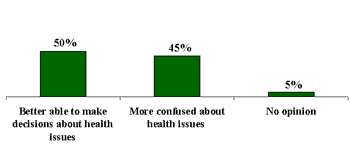 |
| Sep. 5-8, 2002 |
Almost as many Americans say media health reports confuse them as say they provide helpful information. Certainly if the public tends to find media reports about health and medicine confusing, it is not surprising that the public would tend to downgrade its ratings of the overall level of trust that can be given to these reports.
Indeed, we have some important data relating to a very specific, recent health and medical news story: this summer's intense media attention given to new research concerning the benefits versus risks of hormone replacement therapy (HRT) for women. Asked this same "confusion versus benefit" question about these HRT reports, women indicated that the media stories did more to confuse them than to enlighten them.
| Understanding or Confusion? Hormone Replacement Therapy Which comes closer to your view about the recent news reports about hormone replacement therapy -- [ROTATED: the reports left you better able to make decisions about this health issue than before, (or) the reports left you more confused about this health issue than before]? |
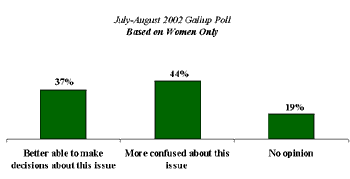 |
One result of the confusion sown by media health reports is an apparent reliance on the part of Americans on their doctors. Almost half of Americans have at least somewhat often asked their doctors specific questions "as a direct result of something they read or saw in the media or on the Internet."
| Questioning Doctors About Information in the
Media or on the Internet How often, if ever, do you ask your doctor questions as a direct result of something you read or saw in the media or on the Internet? |
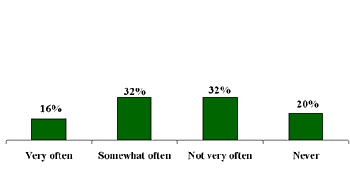 |
| Sep. 5-8, 2002 |
In some ways, then, it appears that the increasing prevalence of media reporting of health and medical news has moved the public back to where it started: relying on its healthcare professionals for guidance. In this light, it may be that the media reports -- particularly the shorter ones on television -- serve primarily as a stimulant for the average consumer, that is, a reminder of new research or a new perspective on a health issue that causes him or her to seek additional information. While some argue that this stimulation effect will lead patients to the Internet, there is little direct evidence in our surveys that the Internet has become a major source of health news. The data seem to be more consistent with the hypothesis that more widely circulating health and media reports increase consumer awareness of health issues, and in turn may be creating a patient population primed with questions and inquiries when Americans visit their family physicians.
Survey Methods
These results are based on telephone interviews with a randomly selected national sample of 1,004 adults, 18 years and older, conducted September 5-8, 2002. For results based on this sample, one can say with 95 percent confidence that the maximum error attributable to sampling and other random effects is plus or minus 3 percentage points. In addition to sampling error, question wording and practical difficulties in conducting surveys can introduce error or bias into the findings of public opinion polls.
Next, we'd like to ask you some questions about health and medical news. First,
Q.54/Q.55 SPLIT SAMPLED
Generally speaking, how much news and information about health or medicine do you get from -- [RANDOM ORDER]-- a great deal, a moderate amount, not much, or none at all?
BASED ON -- 500 -- NATIONAL ADULTS IN FORM A
A. Your doctor
|
Great |
Moderate |
Not |
None |
No |
|
|
2002 Sep 5-8 |
37% |
33 |
20 |
9 |
1 |
B. The nurse at your doctor's office
|
Great |
Moderate |
Not |
None |
No |
|
|
2002 Sep 5-8 |
20% |
29 |
28 |
22 |
1 |
C. The Internet
|
Great |
Moderate |
Not |
None |
No |
|
|
2002 Sep 5-8 |
18% |
19 |
23 |
38 |
2 |
D. Magazines
|
Great |
Moderate |
Not |
None |
No |
|
|
2002 Sep 5-8 |
16% |
35 |
30 |
19 |
* |
E. Newspapers
|
Great |
Moderate |
Not |
None |
No |
|
|
2002 Sep 5-8 |
15% |
37 |
30 |
18 |
* |
F. Television
|
Great |
Moderate |
Not |
None |
No |
|
|
2002 Sep 5-8 |
23% |
41 |
26 |
10 |
* |
G. Books
|
Great |
Moderate |
Not |
None |
No |
|
|
2002 Sep 5-8 |
25% |
31 |
28 |
16 |
* |
|
* Less than 0.5% |
|||||
SUMMARY TABLE: AMOUNT OF NEWS AND INFORMATION ON HEALTH AND MEDICINE
|
2002 Sep 5-8 |
Great |
Moderate amount |
Not much/ None at all |
|
% |
% |
% |
|
|
Your doctor |
37 |
33 |
29 |
|
Books |
25 |
31 |
44 |
|
Television |
23 |
41 |
36 |
|
The nurse at your doctor's office |
20 |
29 |
50 |
|
The Internet |
18 |
19 |
61 |
|
Magazines |
16 |
35 |
49 |
|
Newspapers |
15 |
37 |
48 |
How much trust and confidence would you have in information about health and medicine that you could get from each of the following sources -- a great deal, a moderate amount, not much, or none at all? How about information from -- [RANDOM ORDER]?
BASED ON -- 504 -- NATIONAL ADULTS IN FORM B
A. Your doctor
|
Great |
Moderate |
Not |
None |
No |
|
|
2002 Sep 5-8 |
61% |
32 |
5 |
2 |
* |
B. The nurse at your doctor's office
|
Great |
Moderate |
Not |
None |
No |
|
|
2002 Sep 5-8 |
38% |
45 |
10 |
6 |
1 |
C. The Internet
|
Great |
Moderate |
Not |
None |
No |
|
|
2002 Sep 5-8 |
20% |
42 |
14 |
17 |
7 |
D. Magazines
|
Great |
Moderate |
Not |
None |
No |
|
|
2002 Sep 5-8 |
13% |
49 |
23 |
12 |
3 |
E. Newspapers
|
Great |
Moderate |
Not |
None |
No |
|
|
2002 Sep 5-8 |
12% |
52 |
25 |
10 |
1 |
F. Television
|
Great |
Moderate |
Not |
None |
No |
|
|
2002 Sep 5-8 |
14% |
45 |
31 |
9 |
1 |
G. Books
|
Great |
Moderate |
Not |
None |
No |
|
|
2002 Sep 5-8 |
36% |
46 |
12 |
5 |
1 |
|
* Less than 0.5% |
|||||
SUMMARY TABLE: TRUST IN NEWS AND INFORMATION ON HEALTH AND MEDICINE
|
2002 Sep 5-8 |
Great |
Moderate amount |
Not much/ None at all |
|
% |
% |
% |
|
|
Your doctor |
61 |
32 |
7 |
|
The nurse at your doctor's office |
38 |
45 |
16 |
|
Books |
36 |
46 |
17 |
|
The Internet |
20 |
42 |
31 |
|
Television |
14 |
45 |
40 |
|
Magazines |
13 |
49 |
35 |
|
Newspapers |
12 |
52 |
35 |
How often, if ever, do you ask your doctor questions as a direct result of something you read or saw in the media or on the Internet -- very often, somewhat often, not very often, or never?
|
Very |
Somewhat often |
Not very often |
|
No |
|
|
2002 Sep 5-8 |
16% |
32 |
32 |
20 |
* |
Which comes closer to your view about health and medical news reports -- [ROTATED: the reports leave you better able to make decisions about health issues than before, (or) the reports leave you more confused about health issues than before]?
|
Better able to |
Confused about |
No |
|
|
2002 Sep 5-8 |
50% |
45 |
5 |
